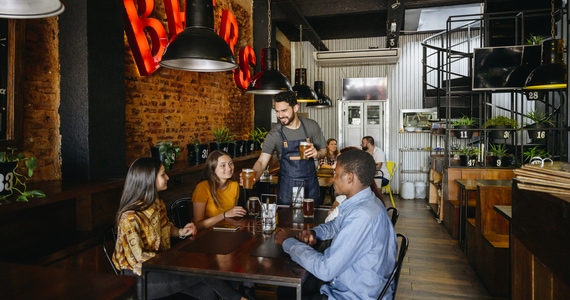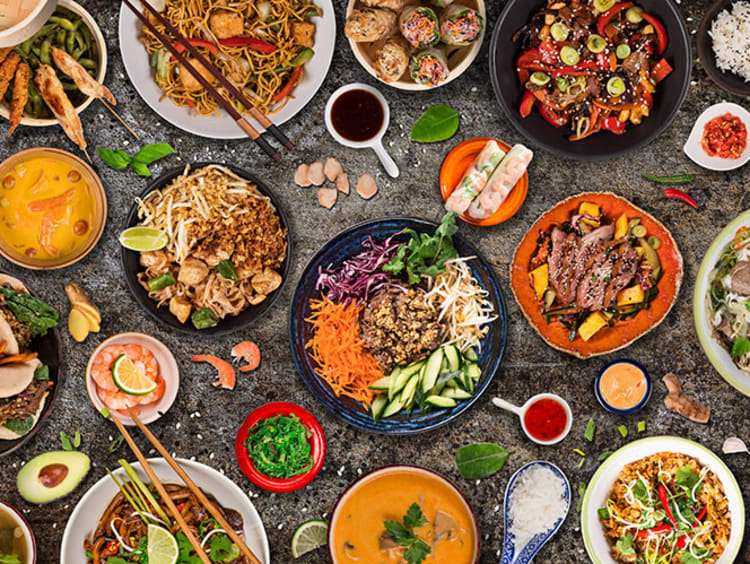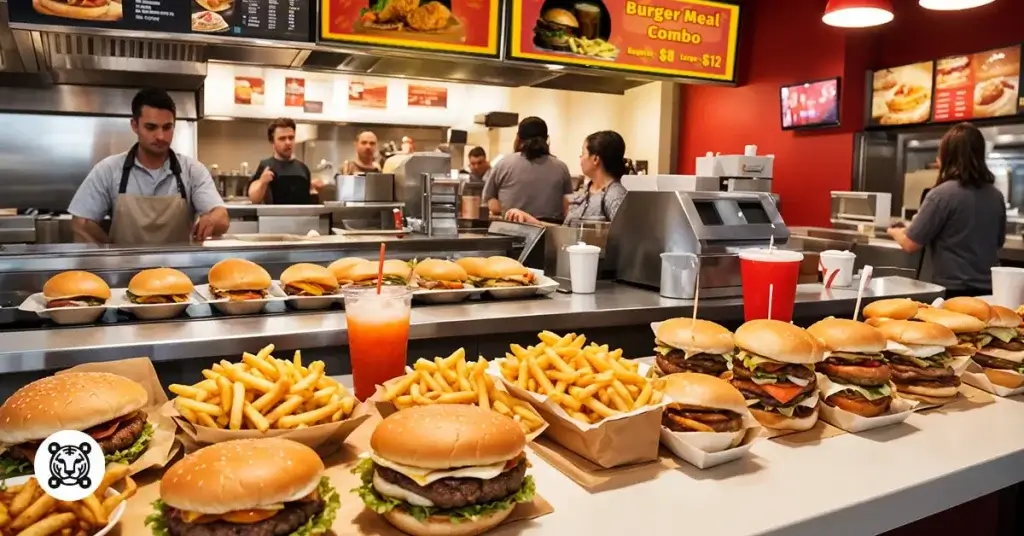How the Best Restaurants are infusing old-world recipes with modern twists
How the Best Restaurants are infusing old-world recipes with modern twists
Blog Article
Dining Delights: Check Out Innovative Restaurants Transforming the Food Scene
The contemporary dining landscape is experiencing a remarkable improvement, noted by innovative restaurants that are redefining cooking standards. From the rise of pop-up facilities embracing seasonal components to immersive experiences that involve the detects in unmatched means, these venues are establishing brand-new standards of what it implies to take pleasure in a meal. Furthermore, an expanding emphasis on sustainability and neighborhood sourcing mirrors a commitment to both high quality and area. As we check out these fads, the inquiry emerges: what future growths might even more improve our culinary experiences?
The Rise of Pop-Up Restaurants
As the culinary landscape evolves, pop-up restaurants have actually become a dynamic force, charming food lovers and entrepreneurs alike. These short-lived eating facilities, typically set up in unconventional areas, use an one-of-a-kind mix of creative thinking and accessibility, attracting a varied variety of customers. The increase of pop-up dining establishments can be attributed to a number of aspects, including the expanding need for novel eating experiences and the entrepreneurial spirit of cooks keen to check their culinary principles without the financial burden of a long-term location.Pop-up dining establishments permit chefs to trying out food selections, designs, and styles, usually concentrating on seasonal or locally-sourced active ingredients. This versatility not only promotes advancement however likewise produces a feeling of seriousness, as patrons are drawn to the limited-time offerings. The ephemeral nature of pop-ups grows a buzz around the eating experience, motivating social media sites sharing and word-of-mouth promotion, which can significantly improve exposure and attract a faithful following.Furthermore, pop-up dining establishments usually satisfy niche markets, ranging from vegan and gluten-free options to ethnic foods, thereby satisfying the diverse dietary preferences of modern-day consumers. Consequently, these establishments add to the rich tapestry of the food scene, pressing limits and tough traditional notions of eating.
Immersive Eating Experiences

Lasting Practices in Cuisine
Accepting sustainability, ingenious restaurants are redefining their culinary techniques to decrease ecological influence while enhancing the dining experience. These establishments prioritize neighborhood sourcing, often teaming up with close-by farmers and producers to assure that active ingredients are fresh and seasonal. This not only minimizes the carbon footprint related to long-distance transport but additionally sustains regional economies.In enhancement to sourcing, restaurants are progressively taking on methods that lower waste. Several are implementing composting systems and utilizing food scraps creatively, changing what would usually be discarded into savory parts of brand-new recipes. Vegetable trimmings can find new life in supplies or garnishes, while stagnant bread is repurposed into croutons or bread puddings.Moreover, the pattern in the direction of plant-based menus is obtaining energy. By stressing vegetables, grains, and vegetables, restaurants can greatly decrease their ecological effect, as plant-based foods typically call for less sources and generate much less greenhouse gas discharges compared to meat production. Ingenious cooks are crafting meals that not only commemorate these ingredients but also offer restaurants with a remarkable cooking experience.Furthermore, many facilities are taking on environment-friendly techniques such as using naturally degradable packaging for takeout and investing in energy-efficient appliances. These steps reflect a dedication to sustainability at every degree of operation, allowing restaurants to enjoy their meals with the understanding that their selections add to a much healthier earth. As the food scene remains to develop, the integration of sustainable practices comes to be not simply a trend, however an essential standard for the future of dining
Tech-Enhanced Eating Journeys
Tech-enhanced eating journeys are revolutionizing the way patrons experience meals, with over 70% of dining establishments now including electronic developments to elevate service and interaction. These developments are not merely patterns; they are basic changes that redefine the cooking landscape. From the moment restaurants enter a restaurant, innovation is effortlessly woven right into the experience, enhancing both ease and enjoyment.One of the most significant developments is using mobile apps for bookings and menu surfing. Restaurants can currently check out thorough summaries, nutritional information, and even the beginnings of active ingredients at their fingertips. This transparency cultivates informed selections and permits visitors to customize their eating experience to their preferences.Furthermore, interactive tables geared up with touchscreens provide an engaging platform for buying and amusement. Restaurants can customize their dishes, explore white wine pairings, and even play games while awaiting their recipes. This assimilation of modern technology not just improves the buying procedure but additionally turns dining into a vibrant, communal activity.Moreover, some establishments are making use of increased reality (AR) to develop immersive eating experiences. By just pointing a mobile phone at a meal, customers can imagine the components and cooking methods in an interesting manner, linking the void in between the cooking and digital worlds.As restaurants continue to embrace these technical technologies, the eating experience becomes progressively customized, effective, and pleasurable. This makeover mirrors a more comprehensive trend in the direction of improving customer involvement, making sure that each dish is not practically sustenance, yet an extraordinary adventure in dining.
Worldwide Tastes With a Twist
The culinary landscape is increasingly marked by blend cuisine innovations that mix conventional tastes with unanticipated aspects - Restaurants. Unique ingredient pairings not just boost the eating experience however also pay homage to cultural heritage, reimagining precious dishes in interesting new methods (Restaurants). This creative method welcomes restaurants to explore diverse international impacts while experiencing acquainted tastes in a fresh context
Combination Food Innovations
Imagination in the cooking arts has brought about a vivid renewal of fusion food, where cooks mix diverse global flavors to create innovative recipes that resist conventional borders. This culinary movement goes beyond plain combination, concentrating on the harmonious combination of components and techniques from various cultures.Restaurants concentrating on blend cuisine are redefining eating experiences by providing meals that narrate with taste, technique, and presentation. For example, the marriage of Japanese sushi with Peruvian ceviche has actually caused one-of-a-kind rolls that celebrate both culinary heritages. In a similar way, Indian seasonings have actually discovered their means into Italian pasta recipes, offering a wonderful spin on classic recipes.Chefs are additionally explore cooking techniques, such as using traditional wok strategies to prepare Latin American stir-fries, thus developing a rich tapestry of tastes and structures. Seasonal accessibility of active ingredients further enhances this creative procedure, enabling for fresh analyses of classic dishes. The attraction of blend food lies in its ability to shock and delight the taste buds, urging restaurants to check out new culinary landscapes while promoting a better admiration for the variety of worldwide gastronomy.
Distinct Active Ingredient Pairings
Culinary development usually flourishes on the unforeseen, and special ingredient pairings are at the forefront of this fad in the modern-day eating landscape. Chefs are increasingly trying out combinations that surprise and delight the palate, boosting the eating experience past standard boundaries.For example, the association of pleasant and full-flavored has come to be a trademark of contemporary food. Eddie's Rise N' Dine Williamsville IL. Consider crispy duck offered with a cherry and balsamic polish, where the flavor of the cherries matches the richness of the meat. Likewise, meals featuring miso-infused delicious chocolate desserts display how umami can improve sweetness, developing a balanced flavor profile that intrigues diners.Furthermore, making use of unusual seasonings in unexpected contexts, such as saffron in a traditional risotto matched with lemon zest, highlights how cooking borders can be redefined. These innovative pairings not just create aesthetic and textural contrasts however also invite restaurants to check out a range of worldwide tastes in a single dish.As restaurants remain to forge ahead, the thrill of finding brand-new preferences through unique ingredient pairings assures to be a specifying attribute of the contemporary food scene, welcoming daring eaters to delight in these innovative cooking discussions
Cultural Heritage Reimagined

The Art of Multi-Sensory Foods
In the domain name of culinary development, multi-sensory dishes are revolutionizing the eating experience by intertwining taste and fragrance in charming methods. The influence of aesthetic presentation improves not simply the aesthetic appeal but additionally the understanding of preference, while thoroughly curated soundscapes raise the setting. With each other, these elements create a holistic experience that engages all detects, changing just how customers connect with food.
Flavor and Aroma Blend
A growing variety of cooks are embracing the idea of like this taste and fragrance combination, acknowledging that a dish is not merely a combination of ingredients however an alternative experience that involves all the detects. This ingenious technique highlights the elaborate connection between preference and odor, both of which significantly affect our understanding of food.Chefs are try out different methods to boost flavors while at the same time crafting aromatic profiles that raise the eating experience. The use of fragrant natural herbs and spices not just includes depth to dishes however also entices the olfactory senses, creating a much more immersive experience. Mixtures, smoke, and important oils are significantly preferred, allowing chefs to control fragrance and boost the overall taste profile.Moreover, the tactical pairing of corresponding and different tastes can stimulate emotional feedbacks, changing a meal right into a remarkable occasion. Restaurants are urged to savor each bite, as the interplay of flavors and fragrances unravels, inviting them to discover new measurements of preference. This thoughtful amalgamation of sensory elements promotes a recognition for the creativity of cuisine, placing taste and aroma blend as a pivotal fad in modern gastronomy.
Visual Discussion Impact
Past taste and fragrance, the visual discussion of a dish plays a crucial role in the overall eating experience. The appearances of food can evoke feelings, set the tone for the dish, and boost the anticipation of sampling. Ingenious dining establishments are increasingly identifying that a recipe's appearance can affect visitors' assumptions and fulfillment levels, occasionally also before the initial bite is taken.Artful plating strategies, lively color mixes, and imaginative garnishes add to a meal's visual allure. Chefs are currently trained not simply in cooking abilities, but also in the art of presentation, often attracting inspiration from various artistic disciplines. The use of negative space in plating aids to produce focal factors, allowing the active ingredients to shine.Moreover, the fad of multi-sensory meals integrates aesthetic aspects with various other detects, such as appearance and temperature, to produce an alternative dining experience. This method urges diners to engage more deeply with their food, transforming an easy meal right into a remarkable occasion. Basically, the aesthetic presentation of food is not just an aesthetic endeavor; it is a vital part of the eating experience that can elevate a meal from common to phenomenal.
Soundscapes in Eating
The experience of eating expands beyond the aesthetic components of a dish; audio additionally plays a considerable function in forming just how food is perceived and delighted in. Innovative restaurants are significantly discovering the concept of soundscapes-- curated audio atmospheres designed to improve the dining experience (Breakfast Served Near Me). The interplay of sound and preference can profoundly influence an individual's assumption of taste, appearance, and overall satisfaction.Research indicates that certain audios can enhance or decrease tastes. Piercing sounds may boost sweetness, while reduced regularities can increase resentment. This sensation has led some chefs and restaurateurs to work together with audio designers, developing one-of-a-kind auditory backdrops that complement their cooking offerings. Restaurants.In these setups, restaurants might find themselves involved in a meticulously crafted audio environment, varying from the gentle rustle of leaves to the rhythmic sounds of a busy kitchen area. Such multisensory dishes not just engage the palate but also stimulate emotional actions, improving the general experience. By taking advantage of the power of noise, these innovative dining establishments are redefining the means we experience food, urging patrons to relish each bite while completely engaging their detects
Community-Centric Culinary Efforts
Frequently, ingenious restaurants are redefining their roles within regional communities by executing cooking initiatives that prioritize social duty and inclusivity. These facilities are significantly engaging in techniques that not only improve their company versions yet likewise add to the well-being of their neighborhoods.One famous fad is the establishment of community kitchens that offer cooking training and job positioning for underserved populaces. These kitchen areas not just supply important skills yet additionally promote a feeling of belonging, equipping individuals to produce their very own cooking courses. Furthermore, numerous dining establishments are partnering with neighborhood farms and manufacturers, highlighting farm-to-table techniques that sustain lasting agriculture and minimize carbon footprints. This not just assures quality and quality however also reinforces regional economies.Another campaign acquiring traction is the principle of public dining experiences, where diverse teams come together to share dishes and stories. This approach cultivates understanding and admiration among different societies, breaking down barriers and cultivating inclusivity. Dining establishments are increasingly taking on waste decrease methods, such as composting and recycling food scraps, which not just addresses environmental problems however also motivates patrons to show on their intake practices.
Regularly Asked Questions
How Do Innovative Restaurants Keep Consistency in Food Top Quality?

What Are the Prices Connected With Starting a Pop-Up Restaurant?
Starting a pop-up dining establishment entails different prices, including location leasing, tools purchases, permits, marketing, staffing, and food supplies. In addition, business owners ought to allocate unanticipated expenses to guarantee smooth procedures throughout the venture's duration.
Just How Do Restaurants Select Their Areas for Pop-Up Events?
Dining establishments pick pop-up event areas based on target demographics, foot web traffic, accessibility, and competition. Furthermore, they take into consideration local market patterns and area engagement opportunities to take full advantage of presence and enhance client experience during the occasion.
What Influence Do Food Trends Have on Dining Establishment Menus?
Food patterns substantially influence dining establishment menus by leading active ingredient choice, affecting dish imagination, and shaping consumer choices. Facilities usually adjust to these trends to improve consumer appeal, preserve competition, and straighten with progressing culinary assumptions.
Exactly How Can Diners Assistance Community-Centric Culinary Initiatives?
Restaurants can sustain community-centric culinary efforts by purchasing from local restaurants, taking part in farm-to-table occasions, involving with food cooperatives, promoting sustainable methods, and advocating for policies that strengthen local food systems and improve area health.
Report this page